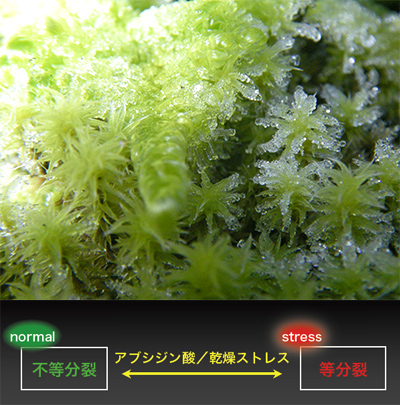Examine the crosstalk between environmental responses and developmental programs – aiming to develop plants that grow well in extreme environments
 Multicellular organisms need to control the number and type of cells that compose their bodies. We observed that, in plants, the stress hormone abscisic acid controls cell division mode in stem cells and that it switches the division mode from asymmetric to symmetric cell division, creating stress-resistant cells. This type of division pattern switching shows the ability of plants to control cell type and cell fate as they adapt to environmental changes. We also noticed that a protein that controls cell cycles may also control stress responses. I believe that this protein holds the key to the cross talk between plant cell proliferation and stress responses.
Multicellular organisms need to control the number and type of cells that compose their bodies. We observed that, in plants, the stress hormone abscisic acid controls cell division mode in stem cells and that it switches the division mode from asymmetric to symmetric cell division, creating stress-resistant cells. This type of division pattern switching shows the ability of plants to control cell type and cell fate as they adapt to environmental changes. We also noticed that a protein that controls cell cycles may also control stress responses. I believe that this protein holds the key to the cross talk between plant cell proliferation and stress responses.
By uncovering how environmental stress and growth programs coordinately control plant growth, it may be possible to develop plants that grow hardily even in extreme environments.
Therefore we will use a biological approach (systems biology) to comprehensively analyse the stress-responsive gene network, with the goal of growing plants in rocky areas and deserts.
Mosses generally grow in moist areas, leading to the perception that they are susceptible to drought. However, the brood cells of many mosses have phenomenal drought resistance. Brood cells can actually revive and restore the entire plant without dying even if over 90% of their water content is lost. Determining the mechanisms of the remarkable drought resistance of brood cells may help improve the drought resistance of other plants.
We also continue to advance our analysis of the molecular mechanisms that protect stress resistant cells against drought, high temperatures, UV radiation, etc. Mosses also are pioneer plants, which can develop soil where none is available. By shedding light on the secret of brood cells and the mystery of their environmental stress resistance, we will improve our understanding of the development of plants that grow well even in hostile environments. By this research, we hope to resolve food, environmental and other problems. We are proceeding with experiments on plant resistance to UV radiation, microgravity, etc. in space in cooperation with JAXA (Japan Aerospace Exploration Agency).
![Tomomichi Fujita Laboratory, Hokkaido University [ Plant Evolutionary and Developmental Biology ]](https://www.sci.hokudai.ac.jp/PlantSUGOIne_en/wp-content/themes/fujitalab-en/img/header-title.png)
